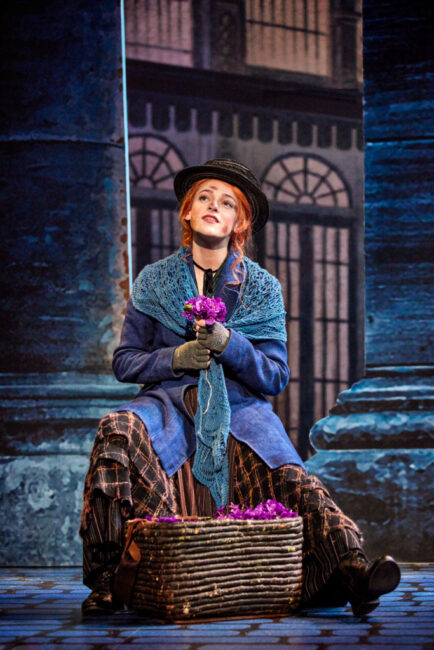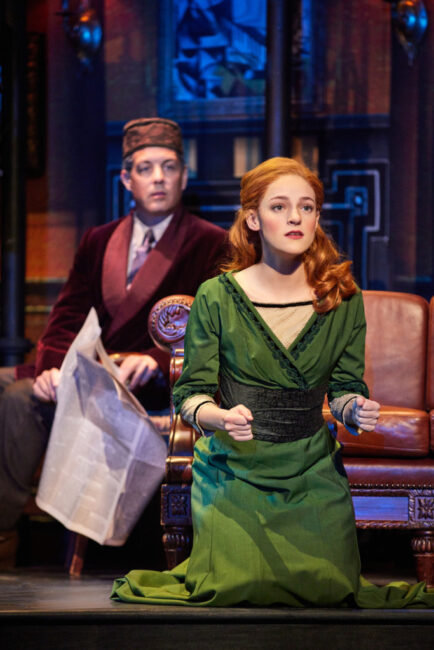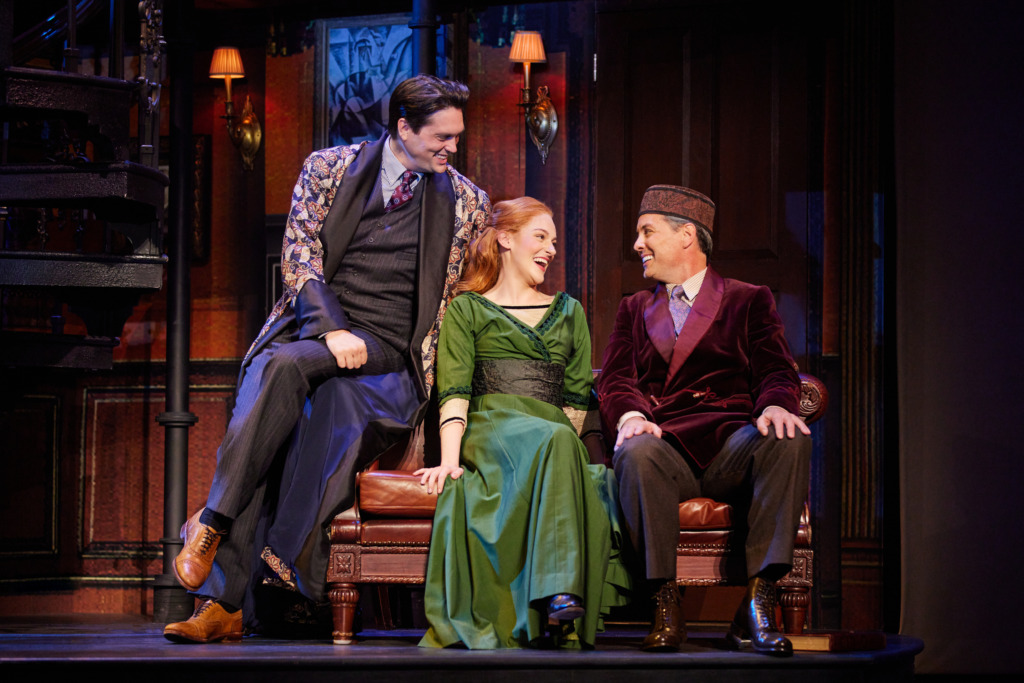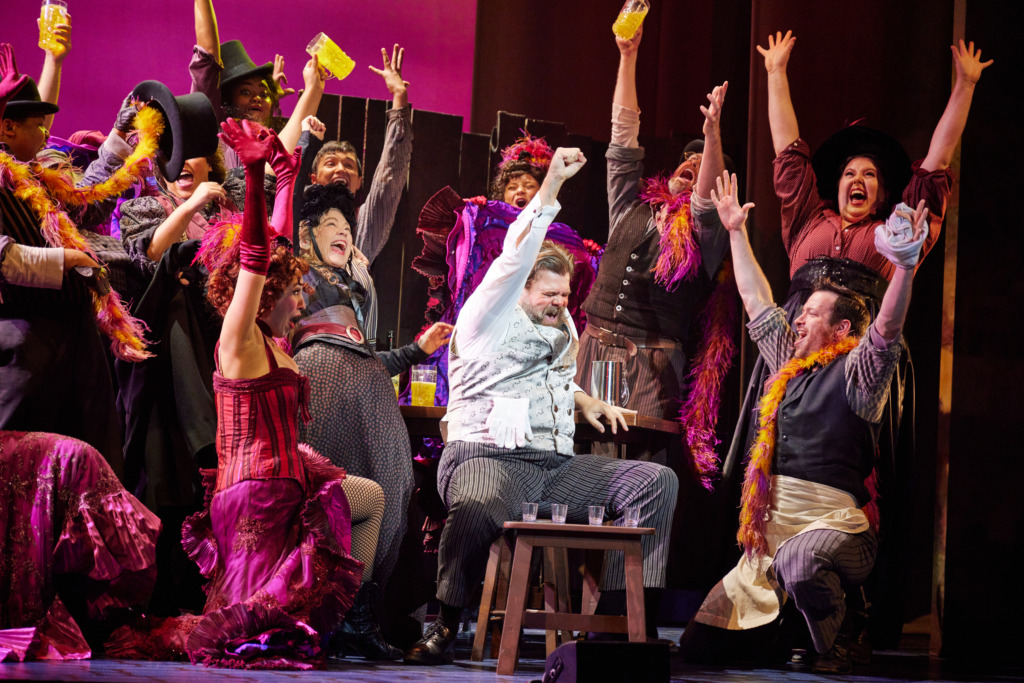“Loverly”
Ain’t it hard to earn an ‘onest livin’ these days? Well, in Edwardian London add in factors like being a woman and being a woman with a thick cockney accent and ‘eaven ‘elp you, guv’nor, but you’re all but done for! OOOOOOOOOOOOooooh, it’s no wonder t’at a character meeting these factors and one t‘at has ‘alf a brain would leap at the opportunity to better ‘er phonetics and elocution ‘if’n it meant she could land a career real proper like, at a proper flower shop. If only she could talk like one of ‘em real and proper ladies….

When we meet our “horribly dirty” heroine, Eliza Doolittle (played by Madeline Powell), she finds herself in such a situation with no prospects out of poverty other than selling flowers on the street to anyone who could throw a brass farthing her way. When by chance, she encounters a professor of phonetics who boasts of his abilities to transform any speaker into one who could pass for the highest of class, she decides to pursue his tutelage to transform her into someone worthy of being hired in a real flower shop, ‘all proper like’. As if guided by the fates themselves, Eliza’s fortune is only further assisted when it just so happens that this very same professor and his houseguest, and fellow linguist aficionado, make a wager that the professor can not only improve her phonetics to be worthy of a flower shop assistant, but to pass her off as a Lady of noble lineage at a royal ball!
Powell does a fine job at performing the transitional characteristics of cockney flower girl to “proper” English speaker throughout, however her strengths do shine more strongly on the “proper” side of the spectrum. Admittedly, there were several technical errors the night I viewed this production including the sound system, but Powell’s cockney did lean a little hard on the “undesirable” attributes, and there were several times the accent came across so slurred or shrill that it was difficult to understand the dialogue.

Nonetheless, Powell shines as a lovely singer, and she will not disappoint in the classics like “I Could Have Danced All Night” and “The Rain in Spain.” One highlight of Powell’s performance does include the moments when she begins to gently revert back into her cockney attributes. The play on elocution is noticeably slight and then stronger as her character becomes more agitated, which adds to the charm of her performance as flower-girl-turned-proper-Lady. While largely focused on the comedic brassiness of her ill-mannered mannerisms throughout much of the story, Powell is also able to woo with more subtle gestures as well; namely in the heartbreaking physicalities she exhibits during the musical number “You Did It” where she beautifully manifests the emotions of feeling cast off like the rubbish she was once called.
Playing both tutor and tormentor to our dear Eliza is Professor Henry Higgins, played by the dashing, mixed with rigid and pompous, Jonathan Grunert. Meant to exhibit many of the elitist and often misogynistic tendencies of the Edwardian Era, Grunert portrays his character well with a finesse of simultaneous aloofness and agitation. As a side note, I was mesmerized by his ability to gracefully fly up and down the spiral staircase on set as if gliding through vertical water. Grunert’s clear and resolute voice also displays a strong magnetism when he speaks (appropriate for a man obsessed with phonetics), and dazzling allure in his musical numbers.
Countering these behaviors on stage is Higgins’ houseguest and fellow linguist, Colonel Pickering, played by John Adkison. Adkison does a marvelous job of not only softening the torment Eliza encounters through her ordeal in the small moments played throughout, but also wonderfully plays to subtle moments and asides that are not only humorous in their delivery, but also show his character’s humanity as a living breathing character whose story may not be told directly in this play, but nonetheless exists within this reality if you pay attention.

Also of note, though brief in plot, is the character of Freddy played by Nathan Haltiwagner. Resigned to mainly playing the lovelorn beau waiting patiently outside for the lovely Eliza, Haltiwagner’s rendition of “On the Street Where You Live” is lovely to the point where the audience will feel themselves floating along with the lovestruck suitor.
Ah yes, characters of plot. Watching this production as a modern theatre enthusiast, one might question “what is the point of Eliza’s father’s storyline in the play?” Sure, his character (and scenes) play a part in cementing her place in society’s lower-class in the beginning of the story, and then later solidifying the notion that after her transition she no longer belongs within her former world, but other than that, the removal of Alfred P. Doolittle’s B-plot storyline would not affect the story other than shaving off at least 30 minutes from the show’s runtime. And if there were a lesser actor playing this role, I would wholeheartedly agree. However, Michael Hegarty shows that he is no lesser actor! From the moment he first stumbles onto the stage, Hegarty shines with his brassy and crass characterizations, and heightens the charm of the show through his renditions of “With a Little Bit of Luck” and the big dance number that is “Get Me to the Church on Time.” The fun-loving and lackadaisical nature Hegarty exudes will charm and amuse you to the point you wish there was more of him in the plot to enjoy!
Theatre today certainly has changed from the Golden Age of the mid-Twentieth Century. But that is the way it’s supposed to be. Nothing is meant to remain the same; if it did, things would quickly become forever stagnant. But having the opportunity to see such classics like My Fair Lady is a chance to essentially step back in time to witness the way things were once done. And certainly with a musical such as Alan Jay Lerner (Books and Lyrics) & Frederick Lowe’s (Music) production, it feels almost as if stepping into a time capsule. The tone and themes of this particular production feel faithful to the original without any overwhelming sensation of “modernization” or even large nods to the audience’s current present. Instead, this production, directed by Bartlett Sher, feels as true to the original 1956 rendition as one in 2023 could expect to experience.

That being said, I think one of the things that set My Fair Lady apart from many other musicals in its day (in addition to its charming and memorable music) was that it didn’t necessarily fit with the big tropes of the day; namely in the vein of having an overarching love story. Higgins’ character makes it very clear that he is not interested in the attention of women, and even more directly in numbers such as “A Hymn to Him”, sees men as the much more preferable of the sexes (in terms of mutual company), and the connection between Eliza and Higgins is predominantly more camaraderie than romantic. And even though the ending is rather abrupt, I think Sher molded it in such a way that this really allows the audience to make their own inference of the subsequent moments of the story after the curtain falls. It is really left to the preferred imaginings of the audience if Eliza and Higgins continue their acquaintance in such a way as to be either romantic or platonic. While this can feel jarring, it also has the opportunity to encourage an activeness on the part of the viewer to decide for themselves what comes next.
But what will you do next, dear viewer? I hope it is not to tarry too long before you get your tickets to see this contemporary take on the “Pygmalion”! Playing at the Hippodrome January 10th through 15th (so short!!), My Fair Lady will waltz on out of Baltimore in the blink of an eye. Don’t miss your chance to see this classical musical straight from the Golden Age of Broadway!
Running Time: Approximately 2 hours and 55 minutes including one 15 minute intermission
My Fair Lady plays through January 15, 2023 at the Hippodrome Theatre- 12 North Eutaw Street Baltimore, MD 21201. For tickets call (410) 837-7400 or purchase them online.

Alfred is a foil to Eliza. He shows how society thinks a person should act when they’re in each situation, while Eliza can’t accept “well enough” because it compromises who she is. When they’re poor, Eliza dreams of wealth and comfort, while Alfred is comfortable where he is, pending “A Little Bit Of Luck” be on his side. When they’ve become wealthy, Eliza struggles because she has to give up too much of herself in order to get there, while Alfred’s only concern is that he’s no longer able to go cavorting around with every woman he sees. He’s always willing to make the best of the situation, regardless of the cost to him, while Eliza won’t let her personality be lost to either side. Alfred defines Eliza’s situation as much as Higgins does, and to downplay his role in Eliza’s story is to downplay Eliza herself, not to mention delete two of the best numbers in the show, including the 11 o’clock number.
Hi Chris! Thanks for your comment! Our reviewers express their opinions of the show for the night that they are in attendance. We appreciate you sharing your opinion too! Thanks for keeping up with and following TheatreBloom!